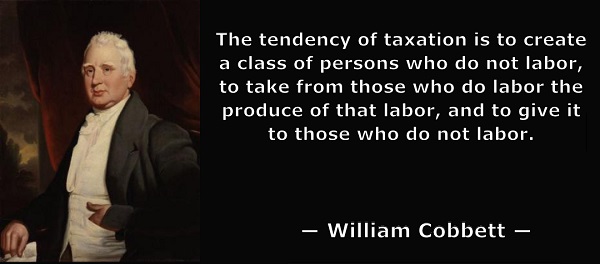
To eliminate misconception as to what taxes are, it is valuable to specify the word “theft.” One good definition is “the wrongful taking and carrying away of the personal products of another.” The definition does not go on to state, “unless you’re the government.”
There is no difference, in concept, between the State taking home and a street gang doing so, other than that the State’s theft is “legal” and its agents are immune from prosecution. Lots of people do not accept that example, due to the fact that the federal government is widely viewed as being of, for, and by the individuals, even though it’s likewise acknowledged as acting severely from time to time.
Expect a thug required your wallet, perhaps since he required money to buy a brand-new automobile and threatened you with violence if you weren’t upcoming. Everybody would call that a criminal act. Expect, however, the thug stated he desired the cash to purchase himself food. Would it still be theft? Expect now that he said he desired your wallet to feed another starving individual, not himself. Would it still be theft?
Now let’s expect that this assailant persuades most of his buddies that it’s okay for him to eliminate you of your wallet. Would it still be theft? What if he persuades a majority of residents? Concepts stand on their own. Even if a criminal act is dedicated for a great purpose, or with the complicity of onlookers, (even if those people call themselves the federal government), it is still an act of criminal aggressiveness.
It is necessary to develop an ethical viewpoint on the matter, even if it doesn’t change your reaction to the mugger’s (or the State’s) needs. Simply as it’s generally reckless to resist an assailant, it’s typically ill-advised to withstand the government, which has a great deal of force on its side.
That’s not to say it’s simple to swim versus the tide. Every year at tax time promoters of huge government haul out a selection of nostrums to sedate the lambs as they are shorn. One of the worst is “Taxes are the rate we pay for civilization,” a statement of Supreme Court Justice Oliver Wendell Holmes. It is a superb example of how, if a lie is big enough and is repeated frequently enough, it can happen accepted.
In fact, the truth is practically precisely the opposite. As Mark Skousen, financial expert and author, has explained: “Tax is the cost we pay for failing to build a civilized society. The higher the tax level, the greater the failure. A centrally prepared totalitarian state is a total failure of civilization, while a completely voluntary society is its supreme success.”
Taxes are destroyers of civilization and society. They impoverish the typical guy. They support well-being programs that anchor the lower classes at the bottom of society. They finance a massive bureaucracy that serves just to raise costs and quash incentive. They pay for public works programs (when called “pork barrel tasks,” and now rechristened “infrastructure investment”) that are usually ten times more pricey than their independently funded equivalents, whether required or not. They keep programs that trigger substantial distortions in the economy (such as deposit insurance for banks). And they promote an environment of worry and dishonesty. The list of evils goes on. However the simple fact is that anything required or wanted by society would be supplied by profit-seeking entrepreneurs, if only the tax collector would retire.
Protesting against taxes since they’re a costly or ineffective way of providing services, nevertheless, is in good step useless. It resembles stating that the thug shouldn’t rob you because there may be a better method for him to get what he wants.
How major is the tax problem in the long run? I believe it will become less, not more major, regardless of the federal government’s increasingly high tax rates and extreme enforcement measures. The significant long-lasting trend of society is towards decentralization and smaller-scale companies. The US federal government will prove say goodbye to able to handle a quickly evolving economy than was the Soviet federal government. A growing number of Americans will see the government as useless and irrelevant, as serving no helpful purpose.

